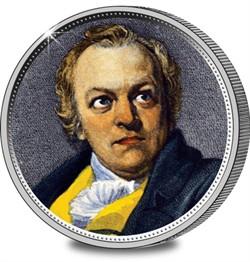
 |
Full name: William Blake
Born: 28th November 1757
Place of Birth: Soho, London
Occupation: Poet, Artist, Illustrator and
Engraver
Died: 12th August 1827
|
William Blake was born in Soho, London on 28th November 1757 to
John Blake, a hosier and was a hugely influential poet, artist and
engraver, but did not gain extensive recognition until 19th
Century, when he became respected and admired by scholars.
Blake's early years were spent being educated by his mother until
he was sent to a drawing school on the Strand, which lead Blake to
become an apprentice for James Basire, an engraver.
Blake spent a large amount of time drawing various monuments and
paintings in Westminster Abbey. Following his comprehensive
apprenticeship, Blake attended the Royal Academy of Arts and was
influenced by a wide variety of artists and painters, such as John
Flaxman. However, Blake challenged the artistic policies
implemented by the President of the Royal Academy, Sir Joshua
Reynolds and Blake was forced to leave.
Blake married his wife, Catherine Boucher, who he taught to read
and write and trained her as an engraver. Catherine helped
Blake with his work and opened a print shop with him, whilst
consistently supporting his visions and ideas. Blake's print
shop opened in 1784 and with the help of a wooden rolling press,
Blake was able to test various printing techniques. Unfortunately,
Blake's print shop was unsuccessful and he spent the remaining part
of his career as an engraver and illustrator.
Throughout his life, Blake was extremely visionary and often
mentioned that he had witnessed angels and the vision of his late
brother, which caused many to claim he was a 'lunatic'. Blake
claimed that his late brother had contacted him with a method of
engraving, which he labelled 'relief engraving'.
Relief engraving became revolutionary for Blake and allowed him
to produce images and text as print as at the same time. A
notebook was left to Blake by his brother, which Blake later called
his 'illuminated books', it combined the words of a poet and the
visions of a painter and Blake filled it with ideas, sketches and
poems.
In 1789, William Blake published his first collection of poems
called 'Songs of Innocence', which was followed by the publication
of 'Songs of Experience' about deceit and domination. Many
poems from Blake's collections such as 'The Tyger' are still taught
today in schools and much of Blake's work has been appreciated more
so after his death than whilst he was alive. William Blake died on
12th August 1827 in London.